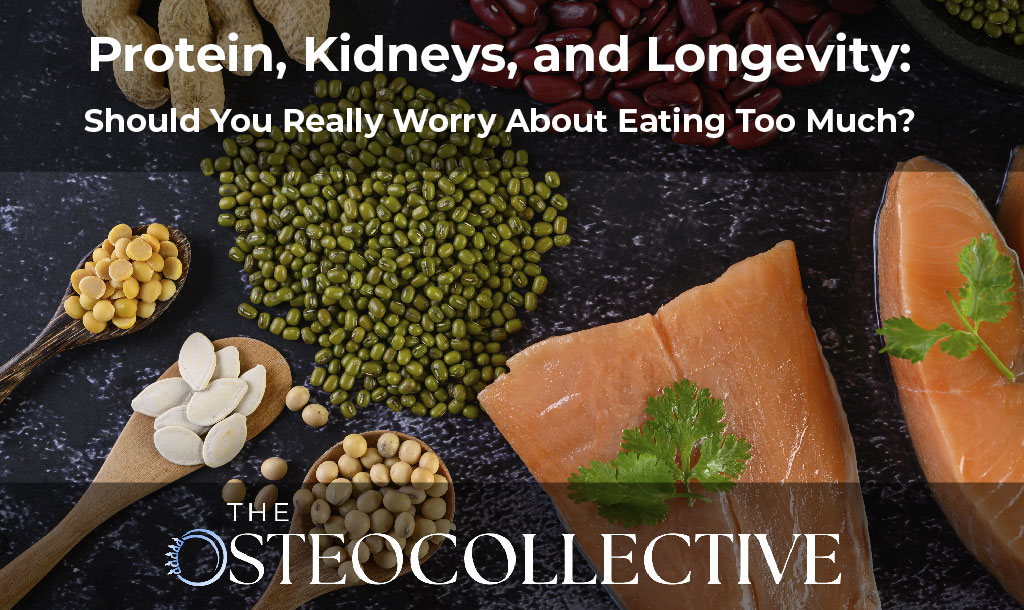live better, longer

We already know there’s a generally positive association between protein intake and bone mineral density (BMD); the more protein you eat, the better your BMD tends to be, especially when calcium intake is adequate. That’s clear from several large population studies and systematic reviews.
But the conversation gets messy when people start worrying about cancer, kidney health, or IGF-1. Influencers like Brian Johnson and David Sinclair often argue for keeping protein low to reduce IGF-1. It’s confusing, especially for those with osteoporosis or declining bone density.
So let’s cut through the noise and look at what the research actually shows about protein, kidneys, and longevity.
A 2024 study using data from the long-running Nurses’ Health Study followed nearly 49,000 women (mean age <60 in 1984) for about 30 years.
Definition of healthy aging: free from 11 major chronic diseases (including kidney disease), no cognitive or physical impairment, and good mental health.
Findings:
A 2024 meta-analysis involving over 150,000 participants found something surprising:
Takeaway: In healthy individuals, protein does not cause CKD, and higher intake may actually be protective. The only time restrictionthat matters is in those with existing, advanced kidney disease.
You’ve probably heard that high-protein diets shorten lifespan. But a 2022 analysis of the NHANES database challenges that idea.
Meta-analyses of RCTs back this up: in healthy adults, higher-protein diets do not harm kidney function or shorten lifespan.
Protein restriction guidelines mainly apply to advanced CKD, not healthy people.
Evidence is limited, and strict restriction often worsens nutrition quality or leads to excessive carbohydrate intake. Some studies show mild benefit in stage 4–5 CKD, but results are mixed and highly individual.
As Dr. Doug says: “If you have healthy kidneys, we don’t need to worry about protein intake. Restriction really only comes into play in severe kidney disease.”
Many people believe they have kidney disease when they don’t. Here’s why:
A single low eGFR reading does not mean you have CKD.
For people with normal kidney function, the data show:
For people with advanced CKD, protein restriction may still have a role—but this is highly individualized and should always be guided by a nephrologist.
If you have osteoporosis or osteopenia, protein isn’t optional.
As Dr. Doug says, “You won’t live longer if you avoid protein, you’ll lose muscle, develop osteoporosis, and increase fracture risk. That has a real impact on both lifespan and healthspan.”
High-protein (or “optimal-protein”) diets are not harmful for healthy kidneys. They’re actually protective for bone, muscle, and long-term vitality.
If you have CKD, work closely with your doctor to set the right protein target. However, if your kidneys are healthy, stop worrying; adequate protein supports both health span and lifespan.
👉 If you’re still unsure how much protein is right for you, or how to balance bone health with longevity, join me in our free OsteoCollective masterclass. I’ll walk you through the myths and misconceptions, and you’ll have a chance to ask your questions live during the Q&A.
Join us LIVE February 17th, 2026 at 4:00pm EST to Learn Dr. Doug's proven framework for Osteoporosis Reversal for FREE. Yes! Reversing Osteoporosis is possible and has happened for hundreds of Dr. Doug's patients.
If you have been blind-sided, feel stuck, confused, and exhausted with your diagnosis, this Masterclass is for you!
*By providing your phone number, you agree to receive text messages related to webinar reminders, promotional offers, updates, and important announcements from The Osteocollective. Message and data rates may apply. Consent is not a condition of purchase.You may unsubscribe at any time by replying STOP.
We hate spam and promise to keep your email address and phone number safe.
x